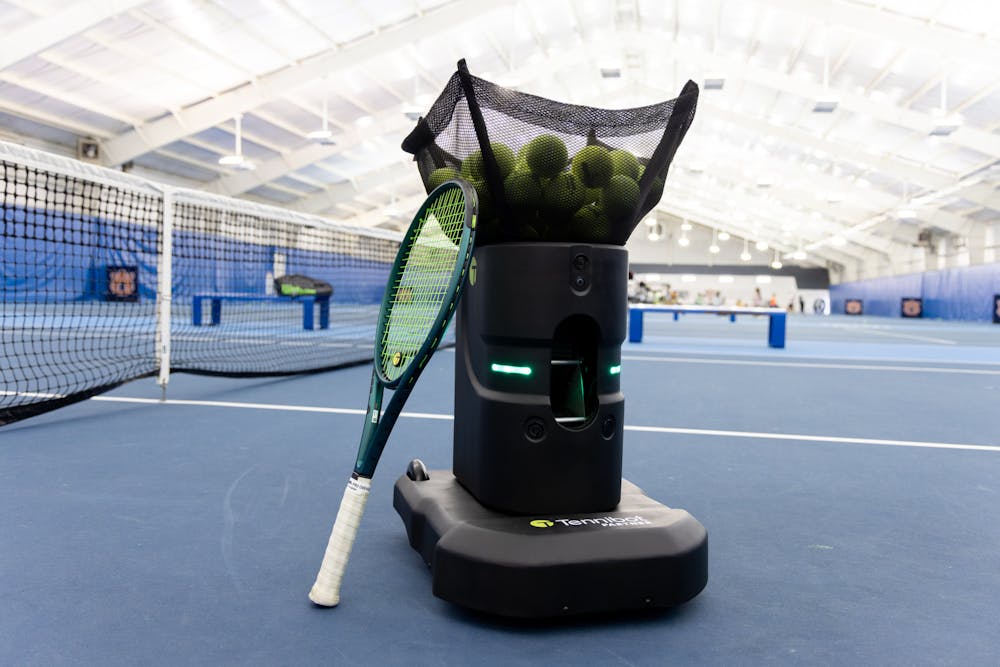At Auburn University’s Yarborough Tennis Courts, tennis balls zip around all day long. But not every ball comes off a racket—some are launched by a robot constructed just minutes away. Tennibot, founded by Auburn University graduates and still based on the Plains, conducts much of its product testing on the courts. Although Tennibot remains local, its challenges have become increasingly global as the company navigates a rapidly changing tariff landscape and complex international legal disputes. Despite the worldwide market headwinds it faces, Tennibot sees itself becoming integral to the lives of millions of tennis and pickleball players.
Tennibot was formed by two Auburn engineering alumni, Haitham Eletrabi and Lincoln Wang. The idea for their first invention materialized when Haitham realized he was spending most of his time at the tennis courts picking up balls rather than playing. When he told Wang about the idea, the two got to work.
Tennibot has since created and started selling two cutting-edge robots. The first, Rover, collects tennis balls from the court like a specially designed Roomba. The new invention, Partner, is much more ambitious: a training machine that moves around and dynamically selects and fires shots based on the player’s preference. It emulates the feeling of playing against a person more effectively than less complicated ball machines. It can even be modified to use pickleballs.
Tennibot faces major new issues due to the Trump administration’s tariff plan. While Tennibot assembles its products in Auburn, many of its constituent parts are reliant on a global supply chain. Retaliatory tariffs could additionally harm Tennibot's sales in the worldwide market, leading to reduced demand alongside higher manufacturing costs.
“We are not happy about it. This applies to every business owner building anything remotely diverse because you have components coming from overseas. We have parts coming from the UK, parts coming from China. And having to deal with this is obviously tricky,” Eletrabi said, when asked about the tariff climate.
This struggle aligns with a broader narrative in Alabama. Many economists predict that tariffs in the South will have a net negative impact, even on the region's growing local manufacturing industry.
“I mean the manufacturing in this region, it’s not going to be helped at all, and the reason is a lot of the intermediate products are imported. So, manufacturing in the Southeast is just going to be hurt,” Henry Thompson, professor emeritus of international economics at Auburn University, said.
Even more broadly, it is suggested that export opportunities, such as those exploited by Tennibot through international sales, mitigate the national job losses caused by free trade.
"So a study by Gordon Hansen called The China Syndrome studied the effect of Chinese imports on U.S. manufacturing employment… What the study showed was that, in fact, roughly 20% of the job losses in manufacturing were from this trade," John Chung, assistant professor of international economics, said. "However, one thing the study doesn’t consider is the effect of the U.S. export opportunity that then brings up some of the job sectors. So, another study by Feenstra and coauthors considered this and suggests that it’s roughly a wash once you add the export opportunity caused by trade globalization."
Additionally, Tennibot must consider engaging in international legal battles to protect its patent rights. Tennibot’s products have been cheaply reproduced by Chinese knockoff ‘startups’ that sell pre-orders at a price point significantly lower than Tennibot’s. Even though they may not have a prototype and the product cannot be shipped to the United States without violating domestic laws, some customers are temporarily misled, resulting in lower demand for Tennibot products.
While Tennibot has patent coverage in China, pursuing claims overseas is much more challenging. These startups must be taken on one at a time, so they create a problem that might not be worthwhile for the company to pursue aggressively. Instead, they suggested improving their patent protection.
“We have a very rich patent portfolio: over 17 patents and trademarks. We have them in the U.S., Europe, Australia, Japan, Canada and China, so our goal is to build on that patent portfolio to expand our patent cover,” Eletrabi said.
Despite these difficulties, Tennibot has continued to grow. Wang and Eletrabi frequently attend robotics events and startup conventions and are dedicated to seeing Tennibot become a fixture on the court, from right here on the Plains. While their price point is significantly higher than that of the average casual player—$2,195 for Partner and $2,995 for Rover—the company is young and has a competitive edge in the industry’s landscape.
Tennibot’s deep connection to the Auburn community exhibits the profound local effects of American foreign policy in a world connected by trade. Still, Tennibot has remained dedicated and grateful to its local roots, even as it pursues global ambitions.
Do you like this story? The Plainsman doesn't accept money from tuition or student fees, and we don't charge a subscription fee. But you can donate to support The Plainsman.





